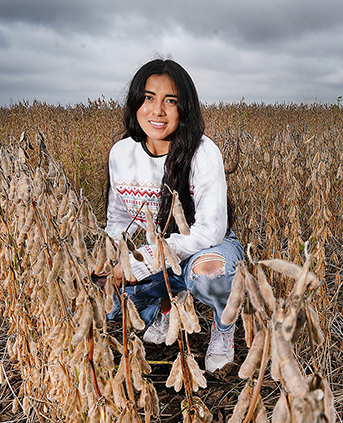The student
In her hometown of Barbosa, Santander — a small rural town four hours northeast of Bogotá, Colombia — Diana Escamilla Sanchez’s grandfather raised a wide variety of crops, mainly for the family’s use. The farm included coffee, oranges, plantains, bananas and corn as well as some cows. Her experience made Escamilla aware of the difficulties small farmers in Colombia faced in marketing their goods. “I felt there were a lot of things that could be improved, that I could find something that could help people like my family,” she says. She credits her parents for supporting her ambitious educational goals: “In a developing country, access to quality education isn’t always easy, and we are competing to get into public university. My dad always made the effort to give me the best he could.” Her scores on a national exam enabled Escamilla to study agronomic engineering at the National University of Colombia, where she won a scholarship for a three-month internship at the University of Arkansas. Seeing first-hand the opportunities U.S. graduate study would offer, she applied to a master’s program at Virginia Tech. There she narrowed her focus to plant breeding because it encompasses all aspects of agronomy, she explains. Purdue’s phenotyping facilities, learning technology and wide range of courses all factored into her choice to join the lab of Katy Martin Rainey, associate professor of plant breeding and genetics, in 2018. In addition to providing academic guidance, Rainey provides the personal support that is especially important for an international student far from home, Escamilla says.
The research
“My research focuses on improving soybean yield and soybean composition,” Escamilla says. Her current work involves data analysis related to modifying soybean composition for animal feed to eliminate the indigestible parts that cause flatulence and discomfort in the animal. “We have a lot of information, images and genomic data and can do a wide range of analysis,” she says. “I’m doing something that is going to help both soybean farmers and people from the animal feeding industries.”
Opportunities
Escamilla calls Purdue’s Data Mine an “internship on campus” that advanced her knowledge of data science and provided hands-on insight into industry. She also has valued her participation in conferences and workshops as well as representing agronomy in the graduate student government. “Being at Purdue — being around the diversity of people that we have here — is the best growing experience you can have personally,” she adds.
Future plans
After completing her degree this December or by May of next year, Escamilla plans to work in the U.S. for a few years to gain industry experience and keep pace with the rapidly changing data analysis field. “Hopefully I can combine a position in genetics with data science,” she says. During the pandemic, Escamilla took up running and now logs up to seven miles three or four times a week, which she says helps her manage stress and balance her time at the computer.
